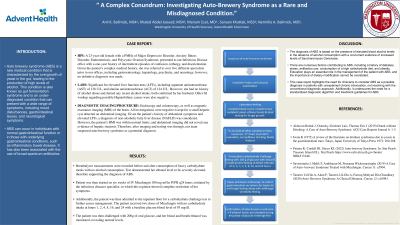Monday Poster Session
Category: Functional Bowel Disease
P1967 - A Complex Conundrum: Investigating Auto-Brewery Syndrome as a Rare and Misdiagnosed Condition
Monday, October 23, 2023
10:30 AM - 4:15 PM PT
Location: Exhibit Hall

Has Audio
.jpg)
Anil Ballmick, BSc
Washington University of Health Sciences
San Pedro, Belize
Presenting Author(s)
Anil Ballmick, BSc1, Marium Esat, MD2, Nermilla Ballmick, MD3
1Washington University of Health Sciences, San Pedro, Belize; 2AdventHealth, Kissimmee, FL; 3CenterWell Primary Care, Las Vegas, NV
Introduction:
Auto brewery syndrome (ABS) is a rare medical condition that is characterized by the overgrowth of yeast in the gut, leading to the production of high levels of alcohol. This condition is also known as gut fermentation syndrome and is an underdiagnosed condition that can present with a wide range of symptoms, including mood disturbances, gastrointestinal issues, and neurological symptoms. ABS can occur in individuals with normal gastrointestinal function or in those with underlying gastrointestinal conditions, such as inflammatory bowel disease, and it has also been associated with the use of broad-spectrum antibiotics.
Case Description/Methods:
Auto brewery syndrome (ABS) is a rare medical condition in which the gastrointestinal system produces alcohol that is absorbed into the bloodstream, leading to chronic intoxication without the consumption of alcohol. A 23-year-old female was referred to our clinic with symptoms including headache, nausea, altered mental state, and loss of coordination. She had a significant medical history for Psychiatric illness, Endometriosis, and PCOS. She had been turned down by numerous specialists before being diagnosed with ABS once consulting with an Infectious Disease Physician, through breathalyzer test results and IV Micafungin treatment. This case highlights the importance of considering ABS as a possible diagnosis for patients with unexplained chronic intoxication and underscores the need for further research and standardization of diagnostic tests.
Discussion:
This case report highlights the need for clinicians to consider ABS as a possible diagnosis in patients with unexplained chronic intoxication, not resolving with the conventional diagnostic approach. Additionally, it underscores the need for a standardized diagnostic algorithm and treatment guidelines for ABS. With the recent advances in molecular biology, metabolomics, and industrial biotechnology, this rare condition may gradually develop into a far more well-
understood clinical entity. Therefore, more extensive studies are urgently needed to establish effective diagnostic and therapeutic options that can help clinicians to better manage ABS. The treatment of ABS involves the use of antifungal agents, such as fluconazole and Micafungin. In addition, dietary modifications, including the restriction of carbohydrates and sugars, may also be effective. Also, patients are strongly advised to avoid alcohol to avoid secondary fermentation events, which can complicate the clinical picture.
Disclosures:
Anil Ballmick, BSc1, Marium Esat, MD2, Nermilla Ballmick, MD3. P1967 - A Complex Conundrum: Investigating Auto-Brewery Syndrome as a Rare and Misdiagnosed Condition, ACG 2023 Annual Scientific Meeting Abstracts. Vancouver, BC, Canada: American College of Gastroenterology.
1Washington University of Health Sciences, San Pedro, Belize; 2AdventHealth, Kissimmee, FL; 3CenterWell Primary Care, Las Vegas, NV
Introduction:
Auto brewery syndrome (ABS) is a rare medical condition that is characterized by the overgrowth of yeast in the gut, leading to the production of high levels of alcohol. This condition is also known as gut fermentation syndrome and is an underdiagnosed condition that can present with a wide range of symptoms, including mood disturbances, gastrointestinal issues, and neurological symptoms. ABS can occur in individuals with normal gastrointestinal function or in those with underlying gastrointestinal conditions, such as inflammatory bowel disease, and it has also been associated with the use of broad-spectrum antibiotics.
Case Description/Methods:
Auto brewery syndrome (ABS) is a rare medical condition in which the gastrointestinal system produces alcohol that is absorbed into the bloodstream, leading to chronic intoxication without the consumption of alcohol. A 23-year-old female was referred to our clinic with symptoms including headache, nausea, altered mental state, and loss of coordination. She had a significant medical history for Psychiatric illness, Endometriosis, and PCOS. She had been turned down by numerous specialists before being diagnosed with ABS once consulting with an Infectious Disease Physician, through breathalyzer test results and IV Micafungin treatment. This case highlights the importance of considering ABS as a possible diagnosis for patients with unexplained chronic intoxication and underscores the need for further research and standardization of diagnostic tests.
Discussion:
This case report highlights the need for clinicians to consider ABS as a possible diagnosis in patients with unexplained chronic intoxication, not resolving with the conventional diagnostic approach. Additionally, it underscores the need for a standardized diagnostic algorithm and treatment guidelines for ABS. With the recent advances in molecular biology, metabolomics, and industrial biotechnology, this rare condition may gradually develop into a far more well-
understood clinical entity. Therefore, more extensive studies are urgently needed to establish effective diagnostic and therapeutic options that can help clinicians to better manage ABS. The treatment of ABS involves the use of antifungal agents, such as fluconazole and Micafungin. In addition, dietary modifications, including the restriction of carbohydrates and sugars, may also be effective. Also, patients are strongly advised to avoid alcohol to avoid secondary fermentation events, which can complicate the clinical picture.
Disclosures:
Anil Ballmick indicated no relevant financial relationships.
Marium Esat indicated no relevant financial relationships.
Nermilla Ballmick indicated no relevant financial relationships.
Anil Ballmick, BSc1, Marium Esat, MD2, Nermilla Ballmick, MD3. P1967 - A Complex Conundrum: Investigating Auto-Brewery Syndrome as a Rare and Misdiagnosed Condition, ACG 2023 Annual Scientific Meeting Abstracts. Vancouver, BC, Canada: American College of Gastroenterology.
